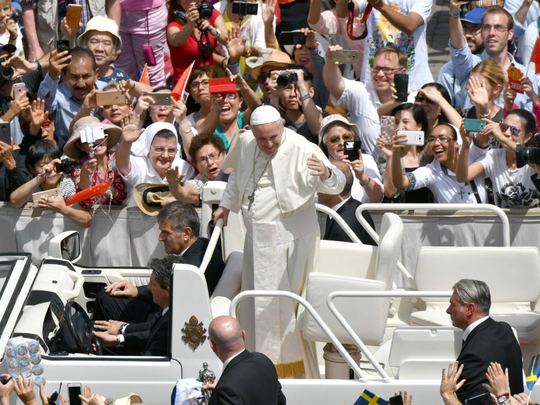
Since he began his papacy more than four years ago, Pope Francis has travelled frequently, visiting countries of all shapes and sizes, from the powerful United States and France to more overlooked places like Sri Lanka and Bosnia.
Whatever the political orientation of the host government — be it centrist or conservative, socialist or populist — Francis has been there. Mexico, Cuba, Turkey, Armenia, Uganda, South Korea, Israel, Jordan, Egypt, Albania — 25 countries in all.
But guess where the pope hasn’t been? His home country: Argentina. He’s come close, visiting neighbouring Brazil and Paraguay. He went to Ecuador too. And recently he announced plans for another trip to South America, this time with stops planned in Colombia, Chile and Peru. But still, no Argentina. The fact is, nobody knows when or even if he will go there. Isn’t it strange?
Francis — or Jorge Bergoglio, the former archbishop of Buenos Aires — does the same thing in Rome that he used to in Argentina: He keeps an eye on politics and the inner workings of Peronism, the political ideology espoused by the previous president, leftist Cristina Fernandez de Kirchner (2007-2015), and most of the country’s other leaders in recent decades. He reads and asks all the time about what is happening in Argentina, and always seeks contacts and direct links. He practices rapprochement, as it were.
He sends greetings on birthdays, writes to his old school friends, calls abuse victims and sends text messages to support people involved in the fight against human trafficking. He speaks with words and gestures, and especially gestures that define him politically. He sent a rosary to the detained neighbourhood association activist Milagro Sala, and acts as an informal patriarch of Peronism, sending everyone the letters and instructions they expect to receive from him.
In those moments, Francis goes back to being “Father Jorge”, the Peronist priest. That he sometimes draws comparisons to General Juan Peron himself — the former leader of Argentina and founding father of Peronism - is no coincidence. He is the same old Father Jorge when he talks about or waits on leading figures of the Kirchner faction who were contemptuous of him even after he became pope, or when he insisted on scowling while meeting with Argentina’s current president, the conservative Mauricio Macri.
Four years of not returning to his country may or may not seem like a long time, depending on one’s perspective. But in Argentina, it feels like we’ve been waiting forever. We see him as our pope, after all. It’s Francis’ decision to make, of course. And presumably there’s a reason for the delay. But it’s hard to imagine what it could be. At any rate, only he knows.
Perhaps the pope doesn’t want to show any favouritism. He didn’t visit when Kirchner was president, so he won’t visit during Macri’s term in office either. Then again, he could come and make a point of meeting both leaders — as a way to even things out. And what if Macri is re-elected in 2019? Will Francis never visit again?
It could be too that the pope worries about “la grieta”, as Argentina’s deep political divisions are known. Maybe he worries that if he comes, he’ll end up being used by one side or the other. But what if the opposite happened? What if his enormous prestige and popularity helped mitigate the political fight while boosting the church’s wider efforts to moderate Argentine politics?
Outside Argentina, Francis has proved to be an able mediator: Between Cuba and the United States, and between the Colombian government and guerrillas. He can pray at the Western Wall in occupied Jerusalem and, while there, embrace a Jewish rabbi and a Muslim imam — both from Argentina. That’s because building bridges is precisely what the Supreme Pontiff does.
Except when it comes to his countrymen, he won’t.
Outside his country, the pope has worked to close rifts and bring faiths nearer. He has carefully attended to the church and its efforts across the globe. No doubt people in other countries are also wondering why Francis doesn’t visit his native land.
Frankly, in Argentina, one doesn’t know what to do to get him to visit. It shouldn’t be that way, but it is.
— Worldcrunch, 2017, in partnership with Clarin/New York Times News Service
Ricardo Roa is executive editor of Clarin, published in Argentina.









